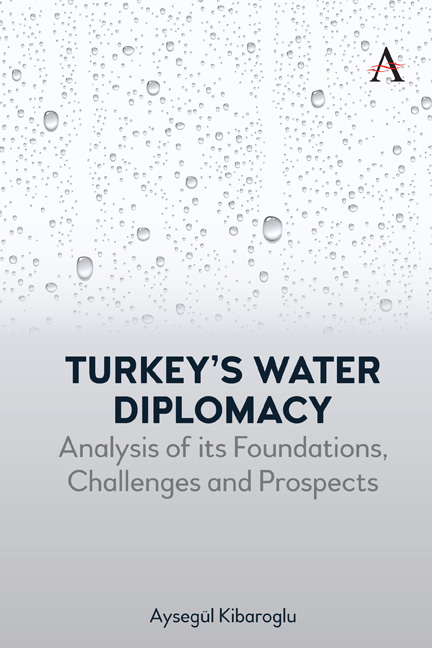Book contents
- Frontmatter
- Contents
- Acknowledgements
- List of Abbreviations
- Introduction
- 1 Institutional Setting
- 2 Water Diplomacy Principles
- 3 Turkey’s Evolving Position vis-à-vis International Water Law
- 4 The Role of History and Geography in Turkey’s Evolving Water Diplomacy
- 5 Analyzing Non-State Actors and Processes in Turkey’s Water Diplomacy Framework
- Conclusion
- References
- Index
2 - Water Diplomacy Principles
Published online by Cambridge University Press: 24 March 2021
- Frontmatter
- Contents
- Acknowledgements
- List of Abbreviations
- Introduction
- 1 Institutional Setting
- 2 Water Diplomacy Principles
- 3 Turkey’s Evolving Position vis-à-vis International Water Law
- 4 The Role of History and Geography in Turkey’s Evolving Water Diplomacy
- 5 Analyzing Non-State Actors and Processes in Turkey’s Water Diplomacy Framework
- Conclusion
- References
- Index
Summary
Overview
Turkey's fundamental foreign policy principles with respect to transboundary waters have been shaped by physical as well as human geography, and influenced by global, regional and bilateral political, economic and social interactions. In this chapter, Turkey's water diplomacy principles will be analyzed by scrutinizing the official manuals and information notes published by the concerned ministries, namely the Ministry of Foreign Affairs (MFA) and the Ministry of Forestry and Water Affairs (MFWA), as well as from speeches and statements delivered by concerned authorities at international gatherings and in the press.
An analysis of the MFA's standpoint on ‘sustainable water management’, through the documents posted on its official website, demonstrates that Turkey's overall water policy and water diplomacy principles are closely connected (Table 1). The MFA's observations on the global water predicament are informed by international scientific studies issued by UN agencies (UN-Water 2018). In this respect, the MFA highlights that more than half of the world's population will be living with a water shortage within 50 years due to the worldwide water crisis. The MFA also draws attention to related global statistics and scientific information: ‘While the world's population grew threefold, water use increased sixfold during the twentieth century, and the problem is further aggravated by the uneven water distribution on earth’. Moreover, the MFA to ask the critical question regarding ‘what governments and international organizations should do to reverse the situation and avert a water crisis at the global level’. The MFA has, indeed, been attentive to the global water situation and has developed discourses on issues such as ensuring global food security for over eight billion people by providing adequate supply of water for irrigation and agriculture. Furthermore, the MFA underlines the importance of the adoption of a more efficient water management system so that governments can meet the most basic human needs (MFA 2018a).
The MFA underlines that ‘water resources are essential for satisfying basic human needs, alleviating health problems, promoting social and economic development in general, and conserving ecosystems’. The MFA stresses the importance of sustainable water resources management in the context of socio-economic development.
- Type
- Chapter
- Information
- Turkey's Water DiplomacyAnalysis of its Foundations, Challenges and Prospects, pp. 31 - 48Publisher: Anthem PressPrint publication year: 2021

